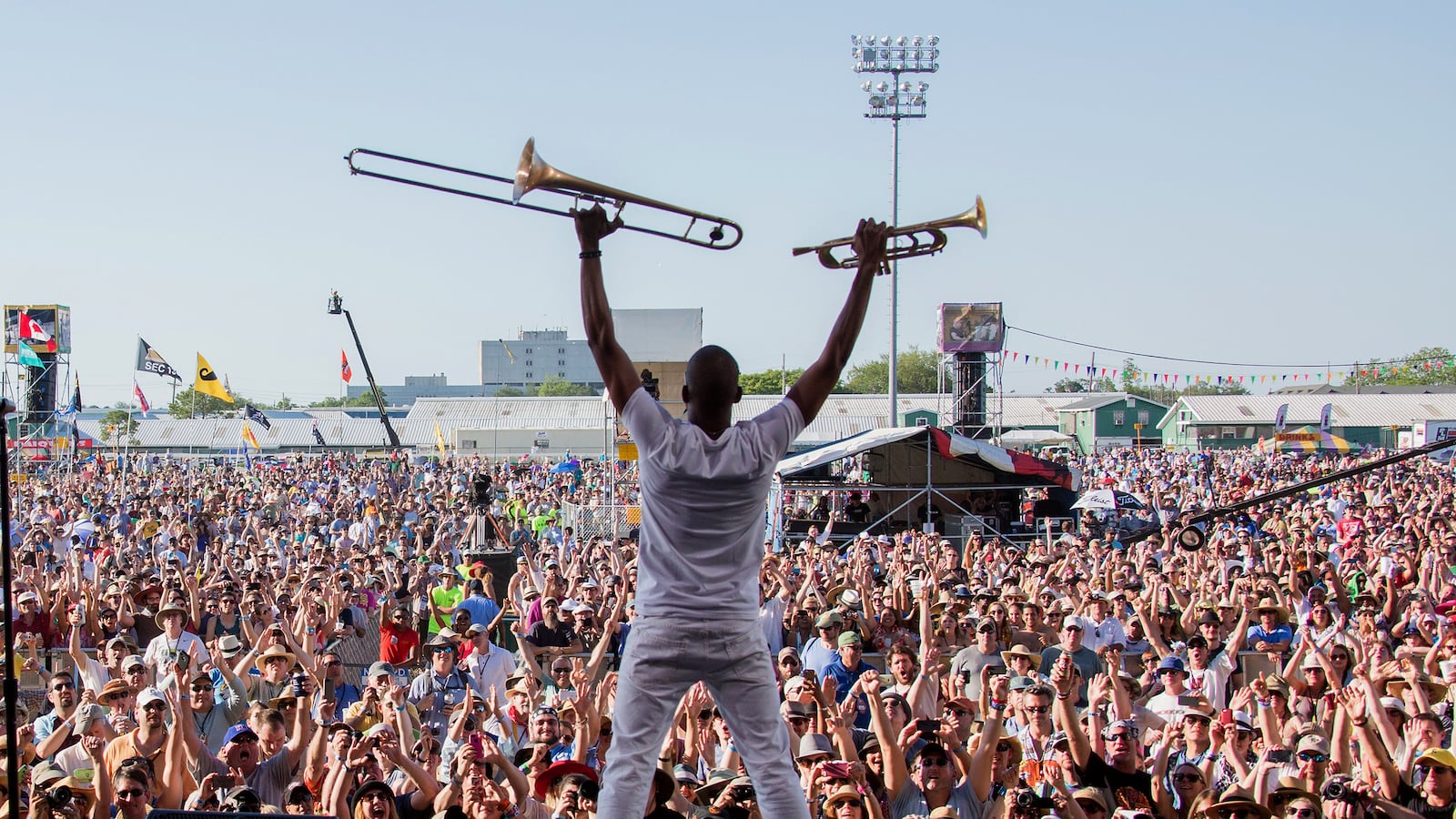Fats Domino has dementia now, but he’s still beloved here in his hometown, where the 46th annual New Orleans Jazz and Heritage Festival concludes this weekend with a special tribute to the 87-year-old rock and roll giant. “Listen,” begins the JazzFest cover story in OffBeat, the city’s leading music magazine. “You can hear Fats Domino everywhere in New Orleans, even in places where there is silence. There is something about his rhythms and melodies that are in the way people walk and horns riff and cars drive and streetcars squeal and cutlery clanks and cast-iron pots simmer.” The adoring article stops just shot of naming Fats the father of rock and roll, asserting that if he and his crack band “didn’t invent it, they perfected it” with songs like “Ain’t That a Shame,” “Blueberry Hill” and “Walking to New Orleans.”
An even earlier New Orleans icon was feted last Sunday at the close of the festival’s opening weekend. “Jelly Roll Morton used to say that he invented jazz,” Dr. Michael White, the clarinetist and musical historian, told the crowd from the People’s Economy stage as his Original Liberty Jazz Band paused between numbers. “He didn’t invent jazz, but he did more for it than anyone else in the early years. He led the transition from ragtime to jazz, proving that written arrangements and improvisation could go together.”
But this year’s Jazz Fest is by no means solely a genuflection to the city’s matchless musical past. Probably no festival in the United States offers a wider ranger of musical genres: Eight stages arrayed throughout the infield of a horseracing track feature jazz, blues, gospel, zydeco, R & B, hip-hop, international, rock and roll, and more. And new as well as established artists are highlighted. All-stars from the New Orleans Center for the Creative Arts, the storied high school whose graduates include Wynton Marsalis, Harry Connick Jr., and Trombone Shorty, are doing two sets: NOCCA alumni played last weekend, current students perform this Saturday.
And last Saturday, if one arose early enough to catch the 11 a.m. opening sets—something many hard-partying Jazz Festers miss—the main stage offered a rousing performance by the To Be Continued Brass Band. Discovered when they were still 9th Ward teenagers playing for tips on the corner of Bourbon and Canal streets in 2007, the TBC has steadily climbed the ranks of the city’s competitive brass band scene. “This was our sixth year in a row playing Jazz Fest,” said Matt Lafrance, who at age 42 is the group’s self-described father figure. TBC initially played the smallest Jazz Fest stage (the Jazz & Heritage stage), then graduated to Congo Square and this year made the big time—the Acura stage, which generally features only the biggest acts. “It’s a phenomenal feeling,” said Lafrance after the TBC wowed the crowd with a string of blasting horns and percussion, notably on “Nagin,” their composition lampooning Ray Nagin, the hapless mayor during Hurricane Katrina who last year was convicted of bribery and money laundering.
Yet for all of Jazz Fest’s celebration of the music, food and culture of New Orleans, some locals complain that a central element is missing: the people. The daily ticket price of $70 is just too high in a city where many folks struggle to get by. In recent years, Jazz Fest’s crowds have become increasingly affluent, old, and white as the festival’s promoters, the AEG corporation, book acts such as The Eagles and this year The Who and Chicago that have precious little to do with the music of New Orleans.
“About the only black faces you see at Jazz Fest anymore are the staff and the musicians,” says Gregg Stafford, a trumpet player who by day teaches public school in New Orleans and by night leads such world-renowned groups as the Young Tuxedo Jazz Band. “Sure, tourists are welcome, but Jazz Fest was started by and for the people of New Orleans to remember and celebrate our heritage. Black people created jazz, the people of New Orleans built this festival, and now it’s being taken away from us. When you see a $70 ticket price, that says to black folks in New Orleans, ‘You’re not invited.’”
Also sadly missing from this year’s Jazz Fest is pianist and singer Henry Butler, a New Orleans local whose gigantic talent has somehow not translated into global acclaim—yet. “I won’t call Henry a genius, because I hate the way that word gets thrown around,” says Tom McDermott, a veteran New Orleans piano player who displays his own extraordinary musical range and light touch on a new album inspired by the sounds of New Orleans, City of Timbres. “But Henry belongs up there with all the great New Orleans piano players, from Professor Longhair to James Booker and Dr. John.”
Fred Kasten, the weekend master of ceremonies at Snug Harbor, the city’s premier jazz club, thinks Butler, who was blinded by glaucoma in infancy, may have worked with the wrong producers in the past. Pointing to Viper’s Drag, the new album Butler made with Steven Bernstein and the Hot 9 band and featuring Herlin Riley, perhaps the greatest drummer in New Orleans, Kasten says, “Bernstein is a great arranger and knows how to pick songs that work well with what Henry does. This could be the band of colleagues that finally brings Henry the mass audience he deserves.”
Butler was supposed to have played the Jelly Roll Morton tribute last Sunday—he covers three Morton tunes on Viper’s Drag, including “Buddy Bolden’s Blues”—but prostate cancer required surgery that put him in a Denver hospital. “Piano Night,” an annual feature of Jazz Fest that takes place the Monday after the first weekend, was accordingly dedicated to Butler this year. “The last time I spoke with him, the surgery was over and the doctors hadn’t decided yet what kind of treatment he’d get after that,” said Dr. Michael White. “He sounded optimistic and said he wanted to do the Jelly Roll gig in the future.”
Perhaps the high point of opening weekend was the stunning performance by vocalist Cassandra Wilson. Introduced as a native of Mississippi who was deeply influenced by New Orleans—at age 26, she moved to New Orleans and was mentored by Ellis Marsalis before heading to New York City—Wilson was just back from Europe, where she was touring to promote her new album, a tribute to Billie Holiday, Coming Forth By Day. “This year marks the one hundredth birthday of one of the biggest influencers of jazz,” Wilson told a standing room only crowd at the WWOZ Jazz tent. Pause. “And she was a woman!” Wilson exulted as her face burst into a winking smile.
Wilson’s powerful, throaty voice is instantly recognizable, but to see her perform in person is also to be transported by that face: those lips that smile a dozen different ways after almost every phrase; those almond eyelids; that lioness hair. Her set included most of the songs on the new Holiday tribute album (though not, oddly, “Strange Fruit”), with her commanding “Sit down!” shout at the conclusion of “Good Morning, Heartache” bringing down the house.
To leave a performance of such stunning beauty and power and hear, moments later and steps away, the plodding beat and croaky, off-tune vocals of The Who was, well, sad. As the legendary English rockers launched into a reprise of their first hit, “My Generation,” it got sadder still. Don’t misunderstand: Pete Townsend and Roger Daltry wrote and performed some terrific, enduring music back in the day. But now—or at least at Jazz Fest—they didn’t even pretend to sing the high harmony line that gives “My Generation” its extra kick. Next came an equally desultory reprise of “Can’t Explain.” Bad music is in short supply at Jazz Fest, but The Who managed it.
You wouldn’t know that from their audience, though. Exiting the venue at the end of the day, one after another of them rhapsodized about what they’d just heard, using words like “phenomenal” and even “the most incredible concert I’ve ever seen.” Never underestimate the power of intoxicants and dedicated fandom.
The true spirit of New Orleans music was not far away, though. Two blocks beyond the festival gate, seven black teenagers were ripping through a tune by the Rebirth Brass Band as hundreds of happy Jazz Festers filed past. They called themselves The Legacy Brass Band; the tuba player’s black-and-white T-shirt read, “2020 College Graduate.” When three white girls in mid-riffs and shorts squeezed among them to flirt and dance, the youngest of the group, an angelic-faced trombonist, blushed but kept on blowing.
As dusk gathered, the girls hoisted the band’s tip box over their heads and strode into the crowd to collect donations for their crushes. Passersby gladly contributed as the music of New Orleans past and present floated among the warm, moist air. The corporate promoters of Jazz Fest may be greedy and exclusionary, but the magic of New Orleans abides for all with the wit to embrace it.






